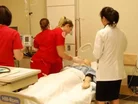Transforming learning experiences of medical students

Written by Danielle Rowe
After the 1999 release of To Err is Human: Building a Safer Health System, a report by the Institute of Medicine regarding the American healthcare system, many in the healthcare field have made a concerted effort to improve the quality of care being given to patients.
According to this report anywhere from 44,000 to 98,000 people “die in hospitals each year as a result of medical errors that could have been prevented.” Citing two major studies, this report defines medical errors as “the failure of a planned action to be completed as intended or the use of a wrong plan to achieve an aim.”
Not only do such errors “exceed attributable deaths to such feared threats as motor-vehicle wrecks, breast cancer and AIDS” (even at the lower estimate), but “beyond their cost in human lives, preventable medical errors […] have been estimated to result in total costs (including the expense of additional care necessitated by the errors, lost income and household productivity, and disability) of between $17 billion and $29 billion per year in hospitals nationwide.”
In response to this report, IU Health, Indiana University School of Medicine and Indiana University School of Nursing partnered together to create The Simulation Center at Fairbanks Hall, “a replica of the patient care environment where healthcare providers can learn to apply cognitive, psychomotor and effective skills in an interdisciplinary approach.”
The Simulation Center is for the practical education of medical students, residents, specialists and nurses. By combining resources, IU Health has created a simulation center with computer-generated surgery, mannequins that respond like real patients and opportunities to react to complicated emergency room dramas under the supervision of staff with years of experience.
With these innovations and educational experiences, IU Health joins the ranks of other prestigious medical programmes, thus bettering the lives of patients and staff alike. Their mission is “to be at the forefront of patient care to create, apply and share the best practice in healthcare education and delivery by replicating the patient care environment where learners can apply knowledge, skills, and attitudes in an interprofessional approach.”
Dr. Josh Mugele, Second-Year Resident Physician, describes the center: “The IU simulation lab is phenomenal. They have rooms set up as clinic offices, OR suites, or emergency department rooms – whatever you need and they have either trained actors or mannequins to simulate real patient experiences.”
Dr. Mugele continues: “The mannequins range from babies to adults to pregnant women. They are advanced enough that you can feel pulses, hear breath sounds and even gauge pupillary response. We are also able to practice procedures on these mannequins such as placing IVs, intubating, or lumbar punctures. The simulations are all videotaped and we're able to view the simulations and debrief with experienced educators.
“It is by far one of the most advanced and largest simulation centers that I've seen. It adds tremendously to the education of medical students, resident physicians and even experienced physicians who need to hone their skills.”
When the Institute of Medicine issued their 1999 report, a “culture of safety” was encouraged, and IU Health has risen to the challenge. Hoosier patients can breathe a little easier, knowing that their IU medical students and residents receive the best education possible, thanks to the Simulation Center at Fairbanks Hall.
The Simulation Center at Fairbanks Hall:
The Healthcare Global magazine is now available on the iPad. Click here to download it.



